新概念英语第二册Lesson4~6重要句型及语法
新概念2册lesson4知识点全讲解
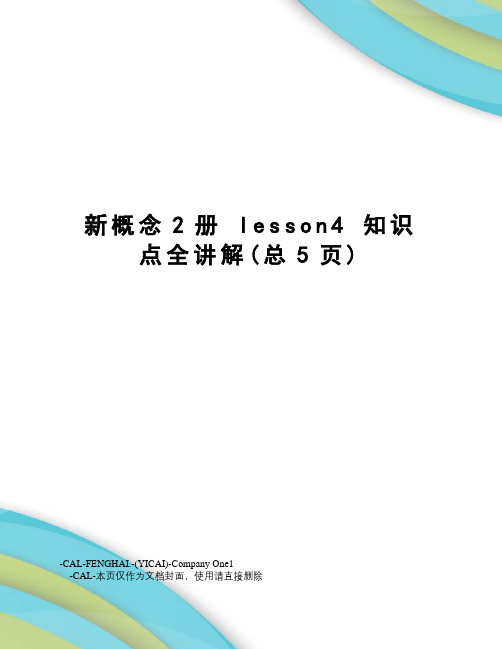
新概念2册l e s s o n4知识点全讲解(总5页)-CAL-FENGHAI.-(YICAI)-Company One1-CAL-本页仅作为文档封面,使用请直接删除Lesson 4 An exciting trip词汇学习1.区分:(1)exciting adj. 令人兴奋的;The news is exciting.这新闻让人兴奋 exciting boy 令人兴奋的男孩.(2)excited adj. 兴奋的-ed: 自己感到/ -ing:令人感到I am excited. 我很兴奋(3)excite v. 激动(这类动词的宾语一定是人,让后面的人感到……)The news excited me. 这个消息使我兴奋。
类似用法:interesting adj. 令人感到有趣的; interested adj. 感到有意思的interesting man, The man is interesting.interest v.对……感兴趣 The book interests me.那本书让我感到很有趣2. receive v. 接受, 收到vt. 接到,收到,得到 When did you receive that letter你什么时候收到那封信的receive 是“收到”,指的是一个被动的动作,主观上接受与否不清楚。
receive/have a letter from sb.accept 同意接收This morning I received a bunch of flowers from a boy, but I didn't accept it.今早我收到一束一个男生送的花,但我没有接受区分:take则是主动的“拿”、“取”I received a beautiful pen from my uncle. 我送叔叔那拿了一支漂亮的笔。
My brother took it from me yesterday. 我哥哥昨天从我这拿的。
(完整版)新概念二册短语及语法总结(打印版)(最新整理)
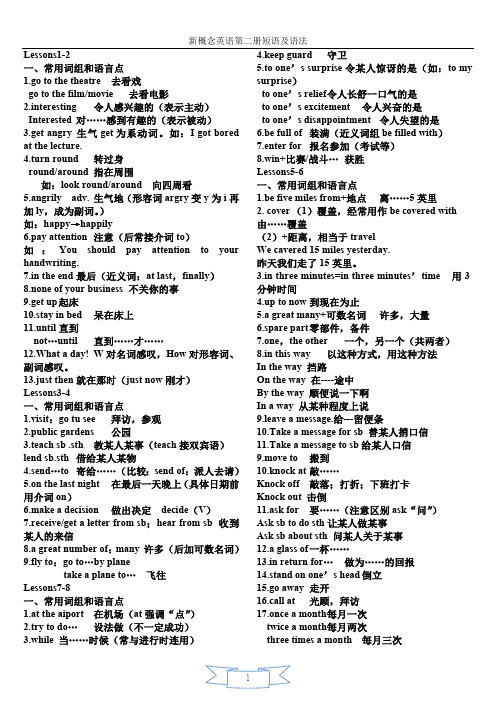
Lessons1-2一、常用词组和语言点1.go to the theatre去看戏go to the film/movie去看电影2.interesting令人感兴趣的(表示主动)Interested对……感到有趣的(表示被动)3.get angry生气get为系动词。
如:I got bored at the lecture.4.turn round转过身round/around指在周围如:look round/around 向四周看5.angrily adv.生气地(形容词argry变y为i再加ly,成为副词。
)如:happy→happily6.pay attention注意(后常接介词to)如:You should pay attention to your handwriting.7.in the end最后(近义词:at last,finally)8.none of your business不关你的事9.get up起床10.stay in bed呆在床上11.until直到not…until直到……才……12.What a day!W对名词感叹,How对形容词、副词感叹。
13.just then就在那时(just now刚才)Lessons3-4一、常用词组和语言点1.visit:go tu see拜访,参观2.public gardens公园3.teach sb .sth教某人某事(teach接双宾语)lend sb.sth借给某人某物4.send…to寄给……(比较:send of:派人去请)5.on the last night在最后一天晚上(具体日期前用介词on)6.make a decision做出决定decide(V)7.receive/get a letter from sb;hear from sb收到某人的来信8.a great number of:many许多(后加可数名词)9.fly to:go to…by planetake a plane to…飞往Lessons7-8一、常用词组和语言点1.at the aiport在机场(at强调“点”)2.try to do…设法做(不一定成功)3.while当……时候(常与进行时连用)4.keep guard守卫5.to one’s surprise令某人惊讶的是(如:to my surprise)to one’s relief令人长舒一口气的是to one’s excitement令人兴奋的是to one’s disappointment令人失望的是6.be full of装满(近义词组be filled with)7.enter for报名参加(考试等)8.win+比赛/战斗…获胜Lessons5-6一、常用词组和语言点1.be five miles from+地点离……5英里2. cover(1)覆盖,经常用作be covered with 由……覆盖(2)+距离,相当于travelWe cavered 15 miles yesterday.昨天我们走了15英里。
新概念英语第二册语法精讲-Lesson4
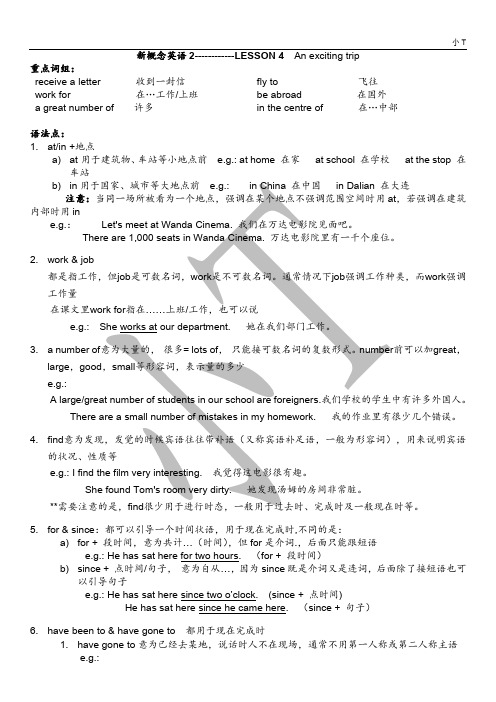
小T 新概念英语2------------LESSON 4 An exciting trip重点词组:receive a letter 收到一封信work for 在…工作/上班a great number of 许多fly to 飞往be abroad 在国外in the centre of 在…中部语法点:1. at/in +地点a) at用于建筑物、车站等小地点前 e.g.: at home 在家at school 在学校at the stop 在车站b) in用于国家、城市等大地点前 e.g.: in China 在中国in Dalian 在大连注意:当同一场所被看为一个地点,强调在某个地点不强调范围空间时用at,若强调在建筑内部时用ine.g.:Let's meet at Wanda Cinema. 我们在万达电影院见面吧。
There are 1,000 seats in Wanda Cinema. 万达电影院里有一千个座位。
2. work & job都是指工作,但job是可数名词,work是不可数名词。
通常情况下job强调工作种类,而work强调工作量在课文里work for指在……上班/工作,也可以说e.g.: She works at our department. 她在我们部门工作。
3. a number of意为大量的,很多= lots of,只能接可数名词的复数形式。
number前可以加great,large,good,small等形容词,表示量的多少e.g.:A large/great number of students in our school are foreigners.我们学校的学生中有许多外国人。
There are a small number of mistakes in my homework. 我的作业里有很少几个错误。
4. find意为发现,发觉的时候宾语往往带补语(又称宾语补足语,一般为形容词),用来说明宾语的状况、性质等e.g.: I find the film very interesting. 我觉得这电影很有趣。
新概念英语第二册-目录-语法总结
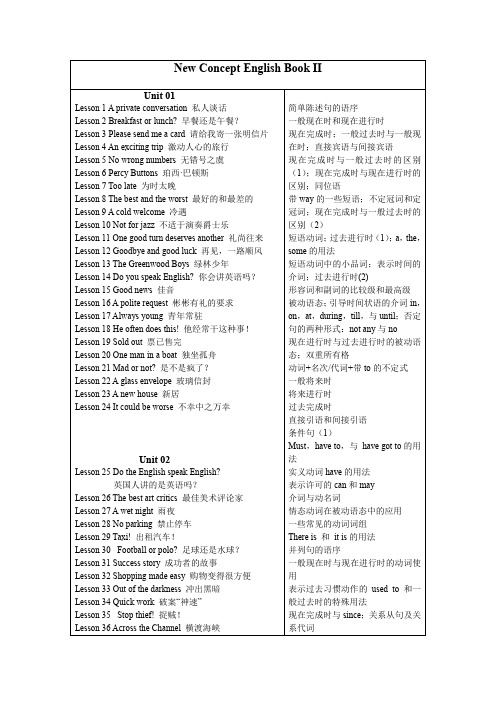
Unit 01
Lesson 1 A private conversation私人谈话
Lesson 2 Breakfast or lunch?早餐还是午餐?
Lesson 3 Please send me a card请给我寄一张明信片
Lesson 4 An exciting trip激动人心的旅行
Lesson91 Three men in a basket三人同篮
Lesson92 Asking for trouble自找麻烦
Lesson93 A noble gift崇高的礼物
Lesson94 Future champions未来的冠军
Lesson95 A fantasy纯属虚构
Lesson96 The dead return亡灵返乡
定冠词the的用法;some与any的区别
过去进行时与一般过去时;use to的用法
比较结构表示法;Little和few的用法
用于表示目的和方向的介词和副词
被动语态用法补充
Will和be going to
一般将来完成时;将来完成进行时
过去完成时与从属连词when,before,after,until
Lesson58 A blessing in disguise?是因祸得福吗?
Lesson59 In or out?进来还是出去?
Lesson60 The future卜算未来
Lesson61 Trouble with the Hubble哈勃望远镜的困境
Lesson62 After the fire大火之后
Lesson21 Mad or not?是不是疯了?
Lesson22 A glass envelope玻璃信封
新概念英语第2册Lesson4~6课文详注

新概念英语第2册Lesson4~6课文详注新概念英语第2册Lesson4课文详注1.He is working for a big firm and he has already visited a great number of different places in Australia. (他)正在为一家大公司工作,并且已经去过澳大利亚的不少地方了。
(1) work for指“在……上班/任职”:Where do you work?你在哪儿上班?I work for a shoe factory.我在一家鞋厂上班。
表达“上班”这个意思时还可以说work at:She works at a department store.她在一家百货商店上班。
(2)a number of只能接可数名词的复数形式。
通常,number前有great, large, good, small, certain等形容词,数量大小也随之改变:A large/ great number of our students are Danish.我们的学生中有许多是丹麦人。
There are a small number of spelling mistakes in your homework.你的家庭作业里有少数几个拼写错误。
2.He will soon visit Darwin. 他不久还将到达尔文去。
will 表示将来要发生的事。
这句话的时态是一般将来时。
(cf. 第12课语法)下一句话From there, he will fly to Perth也是一般将来时。
3.My brother has never been abroad before, so he is finding this trip very exciting. 我弟弟以前从未出过国,因此,他觉得这次旅行非常激动人心。
(1)这句话由两个简单句组成,后一句由连词so引导,为表示结果的状语从句。
新概念英语第二册 lesson 4 笔记和答案
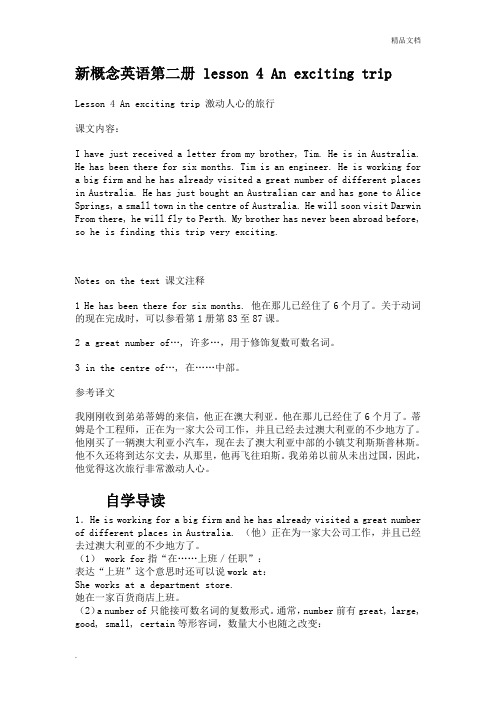
新概念英语第二册 lesson 4 An exciting trip Lesson 4 An exciting trip 激动人心的旅行课文内容:I have just received a letter from my brother, Tim. He is in Australia. He has been there for six months. Tim is an engineer. He is working for a big firm and he has already visited a great number of different places in Australia. He has just bought an Australian car and has gone to Alice Springs, a small town in the centre of Australia. He will soon visit Darwin From there, he will fly to Perth. My brother has never been abroad before, so he is finding this trip very exciting.Notes on the text 课文注释1 He has been there for six months. 他在那儿已经住了6个月了。
关于动词的现在完成时,可以参看第1册第83至87课。
2 a great number of…, 许多…,用于修饰复数可数名词。
3 in the centre of…, 在……中部。
参考译文我刚刚收到弟弟蒂姆的来信,他正在澳大利亚。
他在那儿已经住了6个月了。
蒂姆是个工程师,正在为一家大公司工作,并且已经去过澳大利亚的不少地方了。
他刚买了一辆澳大利亚小汽车,现在去了澳大利亚中部的小镇艾利斯斯普林斯。
新概念英语第二册第4课完整
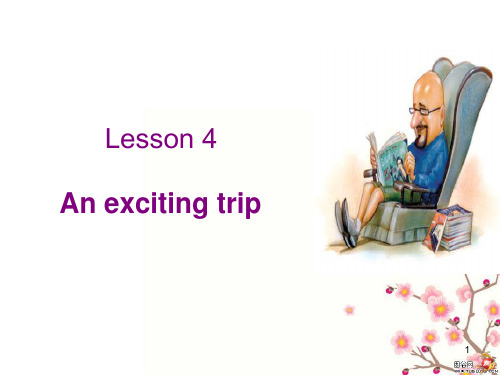
1
New words
exciting adj. 令人兴奋的
excited 感到兴奋的 -ed自己感到 interested, bored -ing令人感到interesting,boring e.g. I am interested in this book.
基本结构
11
时间状语
一般过去时的时间状语: yesterday, last … ,…ago, in1990, in October, just now, …
现在完成时的时间状语: for, since, so far/ up to now/ by now, never, ever, just, already, yet, recently/ lately ,动作发生的次数…
e.g. go abroad, study abroad live abroad, be abroad
5
Language points
1. I have just received a letter from my brother.
收到某人来信 get a letter from sb.
have a letter from sb.
e.g. This morning I received a bunch of flowers but I didn’t accept it.
3
New words
firm different
n.商行,公司 law firm法律公司 = company公司 adj.不同的—— same相同的
be different from 与 ……不同
A has been to, How soon B has gone to, How soon C has been to , How long D has gone to, How long
新概念英语第二册课堂笔记lesson 4 An exciting trip
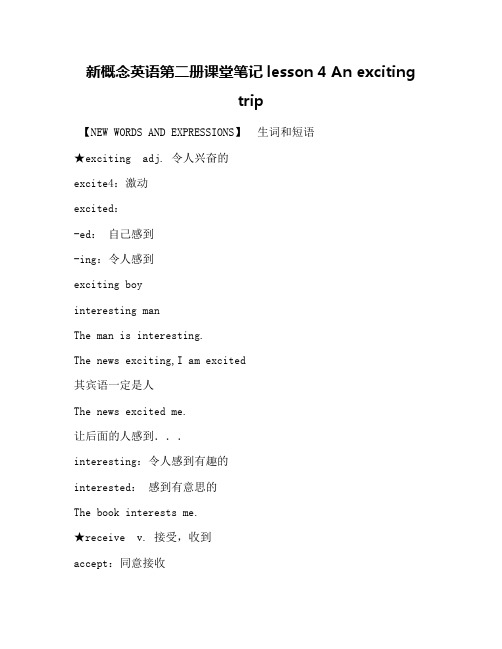
新概念英语第二册课堂笔记lesson 4 An excitingtrip【NEW WORDS AND EXPRESSIONS】生词和短语★exciting adj. 令人兴奋的excite4:激动excited:-ed:自己感到-ing:令人感到exciting boyinteresting manThe man is interesting.The news exciting,I am excited其宾语一定是人The news excited me.让后面的人感到...interesting:令人感到有趣的interested:感到有意思的The book interests me.★receive v. 接受,收到accept:同意接收receive:客观的收到This morning I received a bunch5 of flowers from a boy,but I didn't acceptit.take take the exam:接收考试;take advice接收建议receive/havereceive/have a letter from somebody.★firm n. 商行,公司company★different adj. 不同的★centre n. 中心★abroad adv. 在国外副词,直接和动词连用go aroadlive abroadstudy abroad读音语调要顿拙一些received a letter from just和完成时连用months one month two monthsI'have arrived in Beijing. has beenHe has been in Beijing for one year.has been + in 地点He has been in America for tow1 years.连读work for work in 强调地点work for强调work I am working for a school.I am working in the New Oriental6 school.a great number of :a lot ofa great number of 后面一定要加可数名词复数a lot of 可加可数名词也可加不可数名词i have a lot of friendsI have a great number of friends.has gone to :去了某地没回来has been to :以前去过某地,现在不在那个地方Have you been to Paris?soon:很快(时间)from there:从那地方起from 即能够加时间又能够加地点from half past 8 to half past 11from Beijing to Tianjingfly to Perth: go to Perth by airbefore——副词,在此之前现在完成时态的标志find trip excitingfind +宾语+形容词做宾补find the room clean find her happyis finding I'm finding...。
新概念英语第二册课后练习答案lesson4
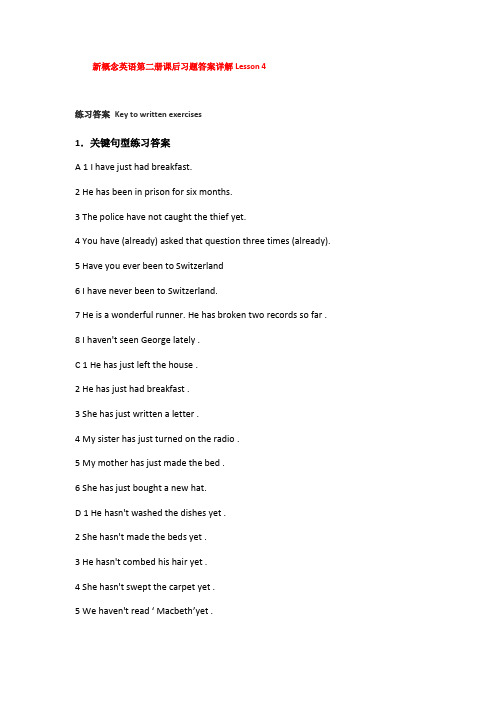
新概念英语第二册课后习题答案详解Lesson 4练习答案Key to written exercises1.关键句型练习答案A 1 I have just had breakfast.2 He has been in prison for six months.3 The police have not caught the thief yet.4 You have (already) asked that question three times (already).5 Have you ever been to Switzerland6 I have never been to Switzerland.7 He is a wonderful runner. He has broken two records so far .8 I haven't seen George lately .C 1 He has just left the house .2 He has just had breakfast .3 She has just written a letter .4 My sister has just turned on the radio .5 My mother has just made the bed .6 She has just bought a new hat.D 1 He hasn't washed the dishes yet .2 She hasn't made the beds yet .3 He hasn't combed his hair yet .4 She hasn't swept the carpet yet .5 W e haven't read ‘ Macbeth’yet .E 1 Have you seen the new play at ‘The Globe’yet2 Have you taken your holidays yet3 Have you read this book yet4 Have you done your homework yet5 Have you finished your work yet2 .难点练习答案1 received2 received3 took4 taken5 take3.多项选择题答案1. d根据课文内容Tim is an engineer. He is working for a big firm..., 只有d. Timis working for a big firm as an engineer 是对的,其他3个与文章不符合。
新概念第二册 第4-6课 知识点总结整理
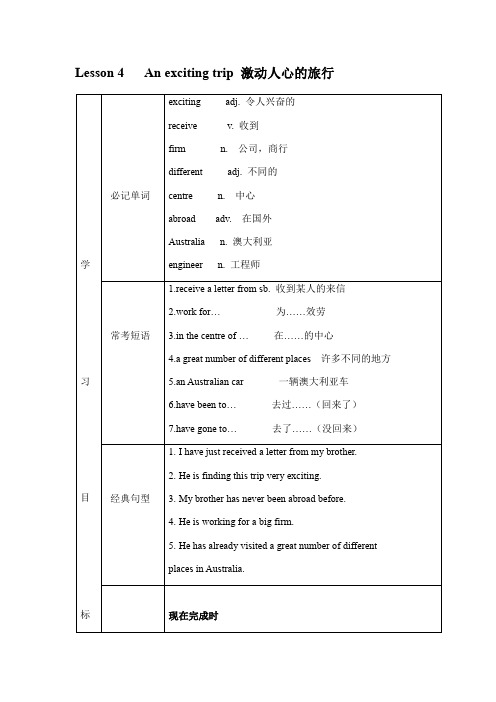
5.My brother hasneverbeen abroadbefore, so he is finding thistrip veryexciting.我弟弟以前从未出过国,因此,他觉得这次旅行非常激动人心。
常考短语
1.receive a letter from sb.收到某人的来信
2.work for…为……效劳
3.in the centre of …在……的中心
4.a great number of different places许多不同的地方
5.an Australian car一辆澳大利亚车
6.have been to…去过……(回来了)
例:I haven't seen much of himrecently (lately).
我已经很久没有看到他(最近的)。
We have seen that filmbefore.
我们以前已经看过那部电影了。
Have they found the missing childyet?
他们找到失踪的孩子了吗?
= hear from sb.
拓展:receivev.接受,收到(客观) / accept:同意接收(主观)
例:This morning I received a bunch of flowers from a boy, but I didn't accept it.今天早上我收到一束小男孩的花,但是我没接受。
distance n.距离
request n.要求,请求
spare part n.备件
service n.服务
新概念英语第二册 Lesson 4

Lesson 4An exciting tripPhrase:1. receive…from 从…收到2. a great number of 许许多多3. work for a firm 为一家公司工作4. in the centre of 在…的中心Intensive Reading:1. a great/ large number/ many of许许多多,修饰可数名词复数,eg. There are a great number of students in the hall.2. a small town in the centre of Australia是宾语Alice Springs的同位语,用来补充说明宾语。
我们必须用逗号把同位语与其它成分隔开。
3.He is finding this trip very exciting. 此句中find经常用于“动词+宾语+宾补”的句型中。
宾补一般是形容词或分词。
eg. I find English very difficult.Key Structure:1.一般现在完成时:1). 用法:A. 描述发生在过去不确定的时间内的行为动作(正确的时间不重要或没有提供),但是动作的结果现在还很明显,汉语中常用“了”“过”来表示。
B. 用来询问对方是否干了某事,eg. Have you had lunch?C. 表示动作发生在过去并且一直延续到现在,甚至还有可能延续下去。
这时,常和“for+一段时间”或“since+过去时间点”连用,for表示动作或状态持续多长时间,而since则表示动作或状态是什么时候开始的。
eg. He has been there for six months. 他在那里待了六个月了。
He has been there since March. 从三月份起,他一直在这儿。
D. 表示相类似的动作在过去已经做过的次数。
注意:瞬间动作不能与表示一段时间的时间状语连用。
新概念英语第二册Lesson4一6词汇学习

【导语】新概念英语学习的“重复原则”,即在整体教法上注重听、说、读、写的反复训练,从量变到质变,让学⽣们的英语⽔平得到质的飞跃。
以下是整理的新概念英语第⼆册Lesson4⼀6词汇学习,欢迎阅读!1.新概念英语第⼆册Lesson4词汇学习 1.receive vt. (1)接到,收到,得到: When did you receive that letter? 你什么时候收到那封信的? Susan received a gift/card this morning. 今天上午苏珊收到了⼀份礼物/⼀张卡。
receive是“收到”,指的是⼀个被动的动作,主观上接受与不接受并不清楚。
take则是主动地“拿”、“取”: He told me to take the keys from his pocket. 他让我从他⼝袋⾥把钥匙拿出来。
I received a beautiful pen from my uncle. My brother took it from me yesterday. 我叔叔给了我⼀枝漂亮的钢笔。
昨天我弟弟把笔拿⾛了。
(2)招待,接待: You need a large room if you are going to receive so many guests. 如果你要接待这么多客⼈,你就需要⼀个⼤房间。
We usually receive guests on Saturday. 我们通常星期六招待宾客。
2.different adj. (名词为difference) (1)不同的,相异的(经常与from连⽤): Desks are different from tables. 书桌与桌⼦不⼀样。
My room is different form yours. 我的房间与你的不同。
We are planning something different this year. 我们今年有不同的打算。
新概念英语第二册Lesson4~6逐句精讲
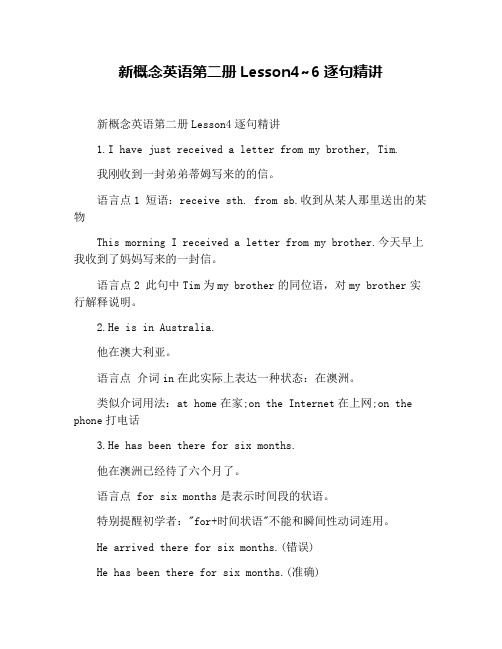
新概念英语第二册Lesson4~6逐句精讲新概念英语第二册Lesson4逐句精讲1.I have just received a letter from my brother, Tim.我刚收到一封弟弟蒂姆写来的的信。
语言点1 短语:receive sth. from sb.收到从某人那里送出的某物This morning I received a letter from my brother.今天早上我收到了妈妈写来的一封信。
语言点2 此句中Tim为my brother的同位语,对my brother实行解释说明。
2.He is in Australia.他在澳大利亚。
语言点介词in在此实际上表达一种状态:在澳洲。
类似介词用法:at home在家;on the Internet在上网;on the phone打电话3.He has been there for six months.他在澳洲已经待了六个月了。
语言点 for six months是表示时间段的状语。
特别提醒初学者:"for+时间状语"不能和瞬间性动词连用。
He arrived there for six months.(错误)He has been there for six months.(准确)原因:瞬间动词的动词不能够延续,而be there表示状态,能够延续。
So far, I have lived in Beijing for eight years.到现在,我已经在北京住了8年了。
4.Tim is an engineer.蒂姆是一名工程师。
语言点 engineer: one who operates an engine工程师,即操作或修理发动机的人1)engine(发动机)+er(表人)——engineer2)fire engine消防车3)engineer(=design/devise)设计:The villa is very well engineered.这套别墅设计得很好。
新概念英语第二册课文语法短语知识点
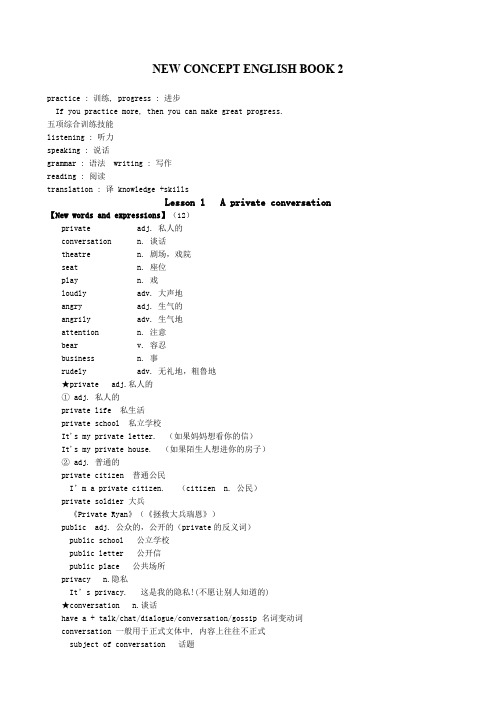
NEW CONCEPT ENGLISH BOOK 2practice : 训练, progress : 进步If you practice more, then you can make great progress.五项综合训练技能listening : 听力speaking : 说话grammar : 语法 writing : 写作reading : 阅读translation : 译 knowledge +skillsLesson 1 A private conversation 【New words and expressions】(12)private adj. 私人的conversation n. 谈话theatre n. 剧场,戏院seat n. 座位play n. 戏loudly adv. 大声地angry adj. 生气的angrily adv. 生气地attention n. 注意bear v. 容忍business n. 事rudely adv. 无礼地,粗鲁地★private adj.私人的① adj. 私人的private life 私生活private school 私立学校It's my private letter. (如果妈妈想看你的信)It's my private house. (如果陌生人想进你的房子)② adj. 普通的private citizen 普通公民I’m a private citizen. (citizen n. 公民)private soldier 大兵《Private Ryan》(《拯救大兵瑞恩》)public adj. 公众的,公开的(private的反义词)public school 公立学校public letter 公开信public place 公共场所privacy n.隐私It’s privacy. 这是我的隐私!(不愿让别人知道的)★conversation n.谈话have a + talk/chat/dialogue/conversation/gossip 名词变动词conversation 一般用于正式文体中, 内容上往往不正式subject of conversation 话题They are having a conversation.talk 内容可正式可不正式, 也可以私人Let’s have a talk.dialogue 对话, 可以指正式国家与国家会谈China and Korea are having a dialogue.chat 闲聊,就是北京人说的“侃”,说的是无关紧要的事。
新概念英语第二册课堂笔记lesson 4 An exciting trip

新概念英语第二册课堂笔记lesson 4 An excitingtrip【NEW WORDS AND EXPRESSIONS】生词和短语★exciting adj. 令人兴奋的excite4:激动excited:-ed:自己感到-ing:令人感到exciting boyinteresting manThe man is interesting.The news exciting,I am excited其宾语一定是人The news excited me.让后面的人感到...interesting:令人感到有趣的interested:感到有意思的The book interests me.★receive v. 接受,收到accept:同意接收receive:客观的收到This morning I received a bunch5 of flowers from a boy,but I didn't acceptit.take take the exam:接收考试;take advice接收建议receive/havereceive/have a letter from somebody.★firm n. 商行,公司company★different adj. 不同的★centre n. 中心★abroad adv. 在国外副词,直接和动词连用go aroadlive abroadstudy abroad读音语调要顿拙一些received a letter from just和完成时连用months one month two monthsI'have arrived in Beijing. has beenHe has been in Beijing for one year.has been + in 地点He has been in America for tow1 years.连读work for work in 强调地点work for强调work I am working for a school.I am working in the New Oriental6 school.a great number of :a lot ofa great number of 后面一定要加可数名词复数a lot of 可加可数名词也可加不可数名词i have a lot of friendsI have a great number of friends.has gone to :去了某地没回来has been to :以前去过某地,现在不在那个地方Have you been to Paris?soon:很快(时间)from there:从那地方起from 即能够加时间又能够加地点from half past 8 to half past 11from Beijing to Tianjingfly to Perth: go to Perth by airbefore——副词,在此之前现在完成时态的标志find trip excitingfind +宾语+形容词做宾补find the room clean find her happyis finding I'm finding...。
- 1、下载文档前请自行甄别文档内容的完整性,平台不提供额外的编辑、内容补充、找答案等附加服务。
- 2、"仅部分预览"的文档,不可在线预览部分如存在完整性等问题,可反馈申请退款(可完整预览的文档不适用该条件!)。
- 3、如文档侵犯您的权益,请联系客服反馈,我们会尽快为您处理(人工客服工作时间:9:00-18:30)。
新概念英语第二册Lesson4~6重要句型及语法新概念英语第二册Lesson4重要句型及语法一、重要句型或语法时态复习现在完成时,表示过去发生的事情对现在造成的影响或结果,如:I have seen the film.该句可能暗含的潜台词是:我对这部电影的情节比较了解了或者我不愿意再看这部电影了。
1)标志性词语:already/just/yet/never/ever2)常见时间状语:recently/lately;in the past/latest+一段时间;up to now/so far3)have been to(去过已回)与have gone to(去了未回)的区别4)瞬间动词(可用于完成时,但不能与一段时间连用)与持续动词的区别5)since(+具体时间/时间点)与for(+一段时间/时间段)的区别二、课文主要语言点I have just received a letter from my brother, Tim. receive sth. from sb.,从某人处收到某物。
句中的Tim是my brother的同位语,补充说明my brother的名字。
He has been there for six months. 句中用has been,不用has gone,是因为此处表达的是他已经在澳大利亚呆了6个月了。
He is working for a big firm and he has already visited a great number of different places in Australia. work for...,表示为某人工作。
firm一般是指较大规模的公司。
a number of表示许多的、大量的,谓语动词用复数;注意与the number of(...的数量,谓语动词用单数)的区别。
He has just bought an Australian car and has gone to Alice Springs, a small town in the centre of Australia. 句中用has gone to,不用has been to,是因为此时Tim人不在说话处,而是已经去了Alice Springs。
a small town in the centre of Australia是Alice Springs 的同位语,补充说明Alice Springs的具体位置。
in the centre of,表示在...中心。
From there, he will fly to Perth. 句中的from there 放到句首,属于句子尾重原则的运用,因为这句话的重点不在于他要从哪儿飞往Perth,而是要强调他将从Alice Springs飞往哪儿,所以要把from there提前。
这么做,还可以起到承上启下的衔接作用。
My brother has never been abroad before, so he is find this trip very exciting. never...before,表示从未,如:She has never learned French before. 句中的find this trip very exciting是:动词+宾语+宾语补足语的用法,宾语补足语一般为形容词,如:He found the room empty. 他发现房间是空的。
三、读写重点1、注意“...and has gone to Alice Springs, a small town in the centre of Australia”中的a small town in the centre of Australia是Alice Springs的同位语,补充说明其所在位置。
2、尾重:From there, he will fly to Perth.此处的From there放在句首,既承接了上文,又使得fly to Perth 的动作得到了强调,是典型的尾重原则的运用。
新概念英语第二册Lesson5重要句型及语法一、重要句型或语法1、时态复习1)一般过去时,表示过去发生的动作或状态,如:Yesterday, a pigeon carried the first message from Pinhurst to Silbury. / He was very tired after a whole day’s work last night.2)现在完成时,表示过去发生的动作对现在造成的影响或结果,如:He has just bought another garage in Pinhurst. / In this way, he has begun his own private ‘telephone’ service.2、有关way的短语1)in the way,表示挡路了或是按照某种方法/方式,如:The chair is in the way. / Do the job in the way your teacher has shown you.2)on the way,表示在路上,如:On the way home, I bought some cakes for my daughter.3)in this way,表示用这种方法,如:In this way, he has saved more than five thousand dollars.4)by the way,表示顺便说一下,如:By the way, have you seen Tom recently?5)in a way,表示在某种意义上,如:In a way, he is more than a teacher to us.二、课文主要语言点Mr. James Scott has a garage in Silbury and now he has just bought another garage in Pinhurst.1)注意garage的读音,美式英语里一般读作/ɡə’rɑːʒ/,英式英语里一般读作/’ɡærɑːʒ/。
2)another一般用来修饰可数名词,而且名词只能用单数,注意与other和the other的区别:one...the other...是两者之间的一个和另一个;other+名词,表示其他的人或物,后面的名词要么用复数可数名词,要么用不可数名词;another一般表示再一个、又一个,而且经常用来指代3个或以上中的另一个。
Pinhurst is only five miles from Silbury, but Mr. Scott cannot get a telephone for his new garage, so he has just bought twelve pigeons.1)...距离+from...,表示两地相距多远。
2)get...for...,表示为...拿到或取得...。
3)注意pigeon(多指家鸽)与dove(指较小品种的鸽,美国称为野鸽)的区别。
Yesterday, a pigeon carried the first message from Pinhurst to Silbury. carry a message,表示传递信息,相当于send a message。
The bird covered the distance in three minutes.1)cover a distance of+距离,表示走过多远的距离。
2)in+时间段,表示在多长时间内,也可以用in+时间段+’/’s+time,经常用来表将来,如:The train will leave in two hours/in two hours’ time。
Up to now, Mr. Scott has sent a great many requests for spare parts and other urgent messages from one garage to the other.1)up to now,表示迄今为止、到现在为止,一般用于现在完成时。
2)a great many,表示许多、大量,相当于a great number of。
3)request,表示礼貌的要求或请求,注意与ask(较为口语化)require(较为生硬或强制性)的区别。
4)spare parts,表示零件。
其中,spare表示空闲的、多余的。
注意spare的一词多义和一词多类,可参考教材第30页中的难点分析。
part表示零件。
5)urgent,表示时间紧急的、紧迫的,注意与emergent(情况危急的)的区别。
In this way, he has begun his own private ‘telephone’service. 1)private,表示私人的、隐私的,可参考第一课中的a private conversation。
2)service,表示业务、服务,来源于动词serve。
server 表示服务器或侍者。
三、读写重点1、尾重:Yesterday, a pigeon carried the first message from Pinhurst to Silbury. 句中的yesterday放在句首,是为了凸显昨天到底发生了什么事情。
类似的句子还有下文里出现的:Up to now, Mr. Scott has sent a great many requests for spare parts and other urgent messages from onte garage to the other.2、衔接:In this way, he has begun his own private ‘telephone’ service. 句中的in this way表示按照这种方式,起到了承上启下的衔接作用,因为this指代的就是前面用鸽子传递信息的方式。
此外,in this way后面用逗号隔开后,既是短语用法的需要,又凸显了后面的句子内容。
新概念英语第二册Lesson6重要句型及语法一、重要句型或语法1、冠词的用法1)不定冠词a/an,如:a pen, an egg2)定冠词the,如:A dog is barking at me. The dog is black and white.3)零冠词,即不用冠词的情况,如人名和地名前面,如:John lives in London.2、短语动词的用法短语动词指的是后面跟上介词或副词后、意思会发生变化的动词。
